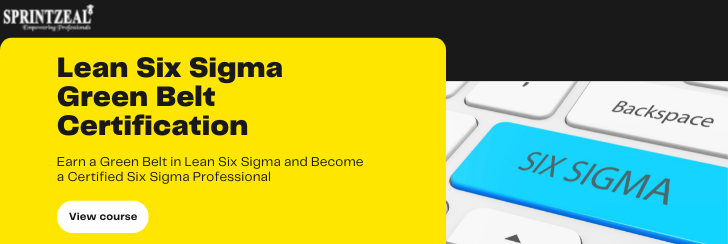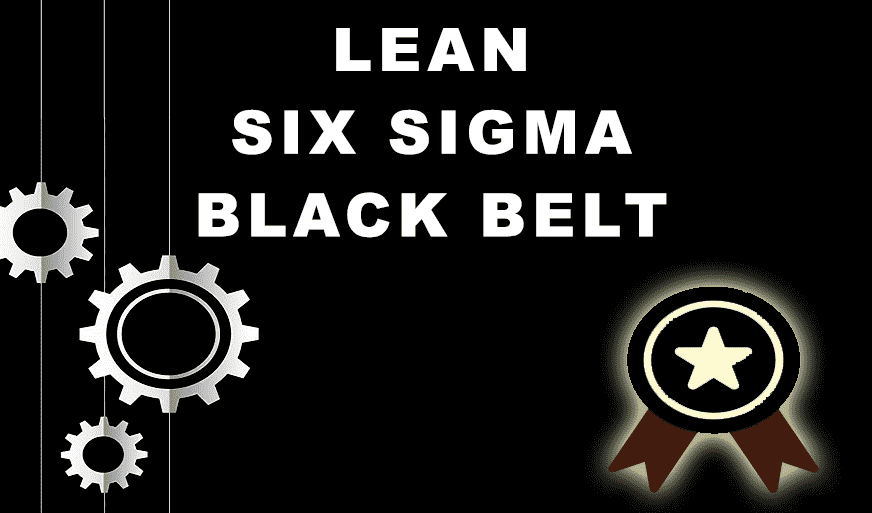Six Sigma Certification Guide - A Professional's Guide
-
 By Syed Irfan
By Syed Irfan - Published on Sep 27 2024

Table of Contents
- Six Sigma Certifications - Overview
- About Six Sigma Process
- Importance of Getting Six Sigma Certified
- Six Sigma Certification Guide: Where to get Six Sigma training?
- Value of an ASQ Certification
- Six sigma certification guide to getting the best Six Sigma certification
- Six Sigma Levels Explained
- Career Opportunities and Benefits of Six Sigma
- Top Reasons to Get Six Sigma Certification
- Steps to Achieving Six Sigma Certification
- Six Sigma Certification FAQs
- Conclusion
Six Sigma Certifications - Overview
There are numerous reasons why you should obtain Six Sigma certifications, one of which is that they add value to your resume. Six Sigma is an array of essential tools and approaches to process management. Six Sigma has become a global trend in businesses all over the world. Companies and individuals use Six Sigma methodologies to boost overall operating efficiencies.
It helps in restoring the business processes and also stresses achieving full productivity in all service characteristics and reducing process errors.
Six Sigma can be daunting to outsiders or individuals who just learn about it, but it doesn't have to be. It is a qualitative methodology that gives a unique view of processes and people to those who practice it.
Six Sigma uses dozens of tools and techniques and has its terminology to define the ideas it uses to meaningfully improve quality by reducing defects.
Even modern professionals can imbibe practical knowledge about Six Sigma's working methodology. The only requirement is to develop quality management literacy by getting to know the basics.
About Six Sigma Process
The most popular Six Sigma process is DMAIC. It is a method of process improvement that is used to improve existing processes that have problems with unknown causes. DMAIC is an acronym majorly used for Define, Measure, Analyze, Improve, and Control.

There are three levels in Six Sigma, Yellow Belt, Green Belt, Black Belt, and Master Black Belt. One can select the most appropriate level for their career objectives.
Importance of Getting Six Sigma Certified
The certification of Lean Six Sigma encourages managers to carefully develop procedures, reduce waste, and optimize value. It is intended for practitioners interested in business process improvement techniques.
If this applies to you and you want to use Six Sigma methodologies in your workplace, you will benefit from the certification.
Here is the importance of getting Six Sigma Certified:

Six Sigma Certification Guide: Where to get Six Sigma training?
The Six Sigma Certification Council maintains the Six Sigma Body of Knowledge for all the belts and also accredits certification-administering organizations. A candidate can locate certification bodies by consulting the Six Sigma accredited directory.
Various other organizations, like Sprintzeal, that offer Six Sigma training programs can also be considered.
For every type of Six Sigma resource, such as training materials, project templates, blogs, a dictionary, quality tools, and a job board, the candidate can visit the Sprintzeal website.
Get Six Sigma Training—Online, Live-Online, and Classroom and get certified.
Six Sigma Yellow Belt Certification
Six Sigma Green Belt Certification
Six Sigma Black Belt Certification
Value of an ASQ Certification
In today's global economy, if you don't get ahead as a company or as a specialist, or keep up with the industry's most recent innovations, you're losing ground to the competition.
Quality is not just a competitive edge anymore; it is a business-critical differentiator that customers are seeking. ASQ certification allows you to stand out and exhibit your additional expertise, regulations, and industry standards.
The professional quality certification standard, ASQ certifications, is peer-reviewed to ensure reliability and integrity, adhering to the ISO 17024 Standard. The standards have to be renewed by demonstrating continued competency.
An independent and established professional association awards the ASQ certification. The association is unaffiliated with any commercial entity, and the certifications are recognized globally.
- It is endorsed by over 125 organisations around the world.
- More than 175,000 ASQ certifications have been issued worldwide.
- ASQ has developed around 18 of its certifications and has offered them in five languages.
ASQ certification exams are delivered by Prometric, a test partner of ASQ. The exam scheduling instructions are available in the letter of eligibility, which is received after the application has been approved.
Six sigma certification guide to getting the best Six Sigma certification
Obtaining Lean Six Sigma certification is a method of demonstrating an individual's knowledge base. To obtain a Six Sigma certification, the candidate must meet the experience requirements, pass a written certification exam, and also demonstrate hands-on skills.
As part of a Six Sigma package, most of the different certification bodies offer training, which additionally includes training materials and written exam costs. The choice exams are properly administered at historic conferences and academic events by Pearson VUE, Prometric, or other certification bodies.
Six Sigma written tests are multiple-choice questions. As qualification levels are assigned, time and complexity increase. Whereas a written examination for the Yellow Belt may take 90 minutes, a Black Belt test can take up to four hours.
Practical certification testing entails completing quality projects with signed affidavits. For example, a Green Belt candidate might be required to complete one project, a Black Belt, two projects, and a Master Black Belt, ten or more projects.
Six Sigma Levels Explained

Career Opportunities and Benefits of Six Sigma
Career advancement - The most common motivation for obtaining a certification represents progress in your profession. Receiving the credential gives employers assurance that you have a specific skill set. Competition at work can be severe. You can distinguish yourself from the crowd by demonstrating your sensitivity and ability to apply to lean six sigma.
At par salaries - Certification in Six Sigma isn't easy to obtain, which is why Six Sigma-certified professionals achieve much recognition and respect. The Six Sigma salary for professionals comes in great packages. Globally, six-sigma professionals are among the highest-paid professionals.
Multiple Industry applicability - How regarded is a Six Sigma credential? Six Sigma strategies include those in banking, electronics, aerospace, IT, financial services, telecommunications, human resources, marketing, and much more. Getting a Six Sigma qualification will undoubtedly lead to better employment opportunities and career progression.
Distinctive roles – A Six Sigma certified professional can become a Lean Six Sigma consultant, a reliability engineer, a process development engineer, or a structural engineer. Attaining six sigma opens up a myriad of professional possibilities. Learning Six Sigma methodologies for your work life can help shape your future career.
Top Reasons to Get Six Sigma Certification
The journey to obtain Six Sigma certification is a strategic move that goes beyond acquiring a credential—it's a commitment to excellence and continuous improvement. Here are compelling reasons why aspiring professionals and seasoned experts alike should consider earning Six Sigma certification:
Career Advancement:
Achieving Six Sigma certification provides a distinct advantage in a competitive job market. Employers recognize and value the skills associated with Six Sigma, making certified professionals stand out. Whether you're aiming for a promotion or exploring new career opportunities, Six Sigma certification can be a catalyst for career advancement.
Enhanced Problem-Solving Skills:
Six Sigma is renowned for its structured problem-solving approach. Certification equips individuals with robust problem-solving methodologies like DMAIC (Define, Measure, Analyze, Improve, Control), empowering them to tackle complex challenges systematically. This skill is not only valuable in the workplace but also applicable to various aspects of life.
Salary Growth and Recognition:
Six Sigma certification is synonymous with expertise and competence. Certified professionals often command higher salaries, reflecting their commitment to quality and efficiency. The recognition and respect that come with Six Sigma certification contribute to a rewarding and financially lucrative career.
Versatility Across Industries:
One of the distinctive features of Six Sigma is its universal applicability. Whether in manufacturing, healthcare, finance, or any other industry, the principles of Six Sigma remain relevant. Earning Six Sigma certification positions individuals as versatile professionals capable of driving improvement initiatives across diverse sectors.
Leadership Development:
Six Sigma certification is not just about statistical tools; it's a comprehensive approach to leadership. Certified professionals learn to lead projects, facilitate teams, and drive organizational change. This leadership development aspect is crucial for those aspiring to take on management roles and lead successful initiatives.
Demonstrated Commitment to Quality:
Certification in Six Sigma signifies a commitment to quality excellence. Employers seek individuals who prioritize delivering high-quality results. By showcasing Six Sigma certification on your resume, you communicate a dedication to continuous improvement and a relentless pursuit of quality in all aspects of your work.
Steps to Achieving Six Sigma Certification
The journey to attain Six Sigma certification involves a well-defined process that reflects dedication and a commitment to mastering the principles of quality improvement. Here are the key steps to guide you on the path to achieving Six Sigma certification:
Understand the Six Sigma Methodology:
Before diving into certification, gain a comprehensive understanding of the Six Sigma methodology. Familiarize yourself with key concepts such as DMAIC (Define, Measure, Analyze, Improve, Control), process improvement, and statistical tools. This foundational knowledge forms the basis for success in Six Sigma certification.
Identify the Right Certification Level:
Six Sigma certifications come in various levels, including Yellow Belt, Green Belt, Black Belt, and Master Black Belt. Assess your career goals and current expertise to determine the most suitable certification level. Each level represents a progression in skills and responsibilities, with Black Belt being the most advanced.
Choose a Reputable Certification Body:
Selecting a recognized and reputable certification body is crucial. Organizations like ASQ (American Society for Quality) offer globally recognized Six Sigma certifications. Research different certification bodies, review their accreditation, and choose the one that aligns with your career objectives.
Meet Experience Requirements:
Different certification levels have specific experience requirements. Ensure that you meet the prerequisites for the chosen certification level. Practical experience is often a key component, and some certifications may require the completion of projects demonstrating the application of Six Sigma principles.
Enroll in a Six Sigma Training Program:
While not mandatory, enrolling in a Six Sigma training program can significantly enhance your preparation. Many certification bodies, as well as external organizations like Sprintzeal, offer comprehensive training programs. These programs often include study materials, practice exams, and guidance from experienced instructors.
Prepare for the Certification Exam:
Thorough preparation is essential for success in the certification exam. Utilize study materials provided during the training program and explore additional resources. Practice exams and sample questions can help you familiarize yourself with the format and level of difficulty.
Six Sigma Certification FAQs
1) Which Six Sigma certification is most recognized?
The Six Sigma Green Belt and Six Sigma Black Belt certifications are the most recognized globally. While both are highly regarded, the Black Belt certification is often seen as the most prestigious, as it signifies advanced knowledge and the ability to lead complex projects. Organizations such as ASQ (American Society for Quality) and IASSC (International Association for Six Sigma Certification) are well-respected bodies that offer these certifications.
To prepare for Six Sigma certification with Sprintzeal:
- Enroll in a Sprintzeal training program for your desired certification level.
- Utilize study materials, practice exams, and resources provided by Sprintzeal.
- Engage with expert instructors to clarify doubts and gain insights.
- Follow a structured study plan to cover all essential concepts.
- Take advantage of Sprintzeal's flexible learning options, including online, live-online, and classroom training.
Conclusion
Six Sigma is a series of meticulously developed instruments and methods to help positively improve organisational processes. Companies and individuals use six sigma methodologies to increase their overall operating performance.
A Six Sigma qualification remains an ideal way to develop the organization's skills as a leader. The Six Sigma exams are rigorous enough, and it cannot be assumed that anyone who obtains Six Sigma certification has fully developed a sophisticated skill set. They become capable of handling the project and all the group improvements.
To get full details about six sigma training, chat with our course expert.
We will help you find the certification that fits your career goals, and you can also explore other popular certifications.
Six Sigma Resources:
Lean six sigma green belt certification
Lean six sigma black belt certification
Subscribe to our Newsletters
Popular Programs
Trending Posts
Explaining QMS Documentation Structure: Benefits and Best Practices
Last updated on Aug 28 2024
ISO 9001 Standard: Benefits and Certification
Last updated on Dec 11 2024
Understanding Lean Manufacturing's Pros and Cons
Last updated on Dec 30 2024
Financial Analyst Interview Questions and Answers 2024
Last updated on Jan 13 2023
Quality Manager Salary: What Freshers & Experts Earn in 2025
Last updated on Feb 3 2025
Lean Continuous Improvement: A Detailed Guide to Mastering Organizational Quality
Last updated on Dec 12 2023
Categories
- Agile Management 54
- AI and Machine Learning 42
- Big Data 53
- Business Management 51
- Cloud Computing 44
- Digital Marketing 56
- Information Security 8
- IT Hardware and Networking 17
- IT Security 103
- IT Service Management 29
- Leadership and Management 1
- Microsoft Program 2
- Other 43
- Programming Language 31
- Project Management 162
- Quality Management 75
- Risk Management 8
- Workplace Skill Building 2
Trending Now
Top Career benefits of Lean Six Sigma Green Belt
ArticleLean methodology, Six Sigma methodology and Lean Six Sigma Explained
ArticleSix Sigma Black Belt Certification – Value and Career Benefits in 2024
ArticlePareto Chart in Six Sigma - Explained
ArticleQuality Management Interview Questions 2024
ArticleSix Sigma Yellow Belt Certification - Six Sigma for Beginners
ArticleQuality Control Explained – Six Sigma
ArticleTotal Quality Management - A Complete Guide for Beginners
ArticleQuality Assurance in Six Sigma Explained
ArticleQuality Assurance vs Quality Control
ArticleSix Sigma Certification – Everything you Need to Know About Getting Certified
ArticleLean Six Sigma on Resume for Rewarding Career Benefits
ArticleQuality Manager Interview Questions and Answers for 2025
ebookService Delivery Manager Interview Questions and Answers (With Examples)
ArticleSix Sigma Interview Questions and Answers 2024
ArticleHow to become a Quality Analyst
ArticleA Supply Chain Management Guide to Mastering Logistics End to End
ArticleSenior Quality Manager Interview Questions and Answers 2024
ArticleTop 30 Quality Analyst Interview Questions and Answers 2025
ArticleFinancial Analyst Interview Questions and Answers 2024
ArticleRisk Manager Interview Questions and Answers 2024
ArticleCompliance Manager Interview Questions and Answers 2024
ArticleOperation Manager Interview Questions and Answers
Article5 Lean Continuous Improvement Principles to Supercharge Your Operations
ArticleHow to Become a Quality Manager - Career, Job Scope and Certifications
ArticleEssential Components of a Quality Management System
ArticleSix Sigma Certifications - Reasons Why you Should Get Them
ArticleTop Qualities of a Good Manager and a Leader
ArticleLearn about Statistical Process Control (SPC) and its top applications
ArticleCost of Poor Quality - A Detailed Guide
ArticleImplementing 5S Methodology for Better Work Efficiency
ArticleWhat Is Lean Management?
ArticleBest Six Sigma Books in 2024
ArticleLeadership vs Management - The Ultimate Guide
ArticleQuality Assurance Plan - Six Steps To Quality Assurance Plan
ArticleOperational Planning Creation, Key Elements and its Benefits
ArticleA Complete Guide to Product Life Cycle Stages 2025
ArticleSix Sigma tools for DMAIC Phases
ArticleWhat Is Lean Manufacturing?- An Overview
ArticleThe Lean Continuous Improvement Model: A Comprehensive Guide
ArticleDMAIC vs. DMADV: Key Differences and Choosing the Right Six Sigma Methodology
ArticleA Deep Dive into the Power of Lean Continuous Improvement Process
ArticleLean Continuous Improvement Methods for Business Excellence
ArticleIntroduction to Lean Manufacturing- Definitions, Framework, and More
ArticleUnderstanding the Key Principles of Lean Manufacturing
ArticleSecret to Unlock Organizational Excellence: Stages of Continuous Improvement
ArticleLean Continuous Improvement: A Detailed Guide to Mastering Organizational Quality
ArticleLean Waste Management: The Ultimate Guide 2023
ArticleA Deep Dive into Lean Continuous Improvement Tools
Article8 Wastes of Lean - Strategies for Identification and Elimination
ArticleThe Ultimate Guide to Lean Manufacturing
ArticleUnderstanding Lean Manufacturing's Pros and Cons
ArticleLean Waste Reduction Strategies: Boost Efficiency and Cut Costs
ArticleTop 10 Lean Manufacturing Tools for Optimal Productivity
ArticleBeyond the Basics: Benefits of Lean Continuous Improvement
ArticleWhat are Quality Standards? | A Guide to ISO Standards
Article7 Important Types of Quality Management System
ArticleA Comprehensive Guide to Quality Management Systems
ArticleISO 9001 Standard: Benefits and Certification
ArticleBenefits of QMS Certification for Your Business
ArticleStep-by-Step Implementation Guide to ISO 9001
ArticleThe Ultimate Guide to ISO 9001: Boosting Quality and Certification Success
ArticleQuality Management System – QSM Approaches and Methodologies
ArticleHow to Effectively Implement a Robust Quality Management System?
ArticleExplaining QMS Documentation Structure: Benefits and Best Practices
ArticleWho Needs ISO 9001 Certification and Why?
ArticleKey Elements of ISO 9001:2015 Quality Management System
ArticleOvercoming Common Challenges in ISO 9001 Certification: Tips and Best Practices
ArticleBest Quality Management Tools
ArticleTotal Quality Management (TQM) vs. Six Sigma
ArticleQuality Manager Salary: What Freshers & Experts Earn in 2025
ArticleCertified Scrum Product Owner: Job Roles And Responsibilities
ArticleTips for Continuous Integration Testing: Streamlining QA
Article10 Quality Management Strategies Adopted by Top Managers
Article
















